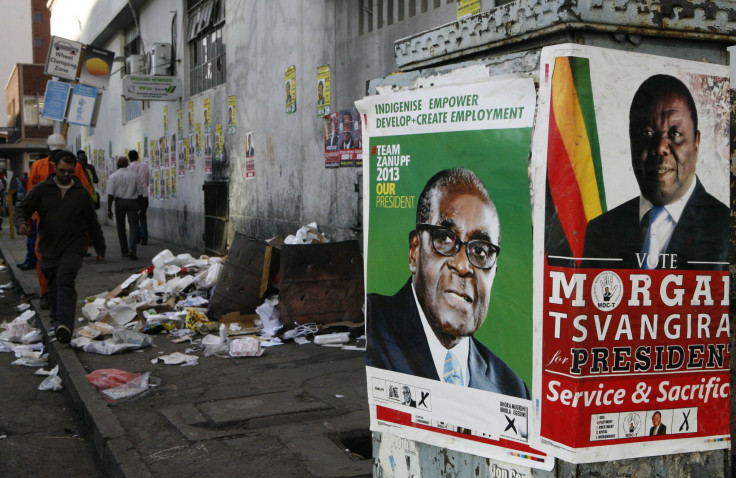In Zimbabwe, 1st TV Is Fighting To Broadcast Independent News Just In Time For Election

After 33 years of state-controlled airwaves in Zimbabwe, a new television station is scheduled to beam content into the southern African country starting at 6 p.m. local time (12:00 p.m. EDT) today -- less than two weeks ahead of a pivotal national election.
1st TV will be based in South Africa's Johannesburg and broadcast into Zimbabwe via satellite. It will provide news, including reports from Zimbabwe, as well as comedy programs, soap operas and talk shows.
The financial backers of this project remain shrouded in secrecy, as independent media is a sensitive issue in Zimbabwe. The air and radio waves have long been controlled by the Zimbabwe Broadcasting System, which is loyal to the ruling Zimbabwe African National Union - Patriotic Front, or ZANU-PF.
On July 31, ZANU-PF's leader Robert Mugabe -- who has ruled Zimbabwe as the country's president for all 33 years of its independence -- will face off against his longtime opponent Morgan Tsvangirai in a presidential election. Many fear the poll will erupt into state-sponsored violence, as it did five years ago when the same two candidates went head to head.
That conflict, which killed more than 200 people and forced Tsvangirai to withdraw, came to an end when the regional community stepped in to broker a power-sharing agreement that saw Mugabe maintain the presidency, with Tsvangirai becoming prime minister. The arrangement has been an uneasy one at best.
Tsvangirai now hopes to unseat the president, who was gained a reputation for heavy suppression and dire economic mismanagement. But the election so far has been marred by difficulties; voter registration was a messy and complicated affair, as was the round of early voting that took place this week for those who will work security on voting day.
Members of the opposition party -- Tsvangirai's Movement for Democratic Change, or MDC -- have criticized Mugabe for neglecting to allow time for the implementation of much-needed electoral reforms. And, concerns are running high that young urban voters, who are more likely to support the MDC, will face extra difficulties casting their ballot on July 31.
Also, there are suspicions that Mugabe's mental health is deteriorating -- he has a habit of lashing out verbally and criticized the United States for its concerns about the Thursday election.
"In America they are saying Zimbabwe has gone for an early election without reforms. Americans must be mad and absolutely insane," Mugabe said, during a speech that lasted for more than two hours, according to Reuters.
1st TV may become a dangerous undertaking for contributing Zimbabwean journalists, but the channel's spokesperson, Temba Hove, told the Africa Report that the station was adamant about providing objective information during Zimbabwe's greatest time of need.
"Thirty-three years after independence it is high time that the people get what they demand and deserve in respect to their right to information," she said.
Demand for 1st TV's coverage should indeed be significant -- now more than ever. Earlier this month, Zimbabweans lost access to several free-to-air channels from the South African Broadcasting Corporation.
Sentech, the state-owned South African company that had provided the signal, finally encrypted it in accordance with a 2012 court ruling. The loss prompted waves of complaints from Zimbabweans who had been using decoders to gain free access to South African comedies, news shows and other programs.
If 1st TV begins broadcasting on schedule, those same decoders can be used to pick up the new programming. The station does not claim to support any one candidate over another in the upcoming election, but the Zimbabwean ruling party is sure to put up a stiff resistance.
Zanu-PF spokesman Rugare Gumbo told the BBC that the party did not welcome the new station. "It's hostile," he said. "We only deal with information that emanates from Zimbabwe. They are welcome to come and register in Zimbabwe and follow the normal procedures."
© Copyright IBTimes 2024. All rights reserved.





















